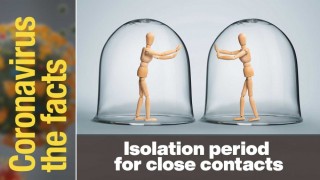Loading
Search
▼ Japan Reduces Isolation Period For Close Contacts
- Category:Other
Isolation period reduced
As Japan experiences record infection numbers, the central government has shortened the isolation period for people classified as close contacts. The change is intended to reduce the impact the isolation rules are having on economic and social activities.
A close contact is anyone living with an infected relative, and anyone who spends 15 minutes or more within one meter of an infected person without anti-infection measures in place, such as wearing a mask.
Previously, close contacts were required to isolate for seven days, in principle. If they recorded negative antigen tests on days three and four, the isolation could end on the fifth day.
From July 22, the required period to isolate is now five days, in principle. People who test negative on days two and three can end isolation on the third day.
The five-day isolation period for close contacts starts from any of the following:
- The day the infected person developed symptoms
- The day an asymptomatic person tested positive
- The day anti-infection measures were put into place in a household where someone has COVID-19
Health must be monitored for one week
Even with the shortened isolation period, close contacts must monitor their condition and avoid meeting with vulnerable people, including the elderly, for seven days.
Exception for essential workers
An exception exists for essential workers, including medical workers and staff at care facilities.
Even as close contacts, if they test negative every day, have no symptoms and have completed three vaccinations, they are allowed to carry on working without isolating.
Finding a balance
During the current infection wave, the business community has voiced concerns that employees who became close contacts were unable to work even if they had no symptoms that interfered with their duties.
And although essential workers have been allowed to work under the conditions outlined earlier, many were being cautious about going to work, leading to staff shortages.
The shortened isolation period aims to find a balance between containing the virus, and keeping the economy and social activities ticking along.
Many sectors are already heavily impacted, including medical institutions, public transportation, and the postal service.
- August 5, 2022
- Comment (0)
- Trackback(0)


